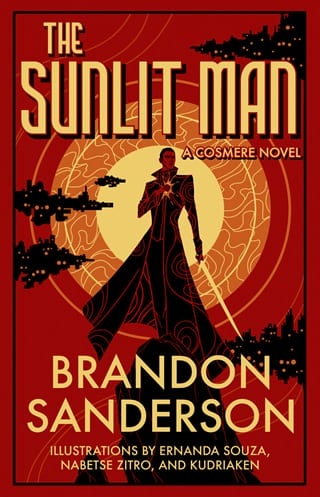Chapter Twenty-Four
It was a fine explosion. Lit up the darkness with a flare of orange and yellow as the housing for the engine gave out. He probably hadn't made it thick enough; he'd worried about that.
They stood at the edge of Beacon as it flew, looking out over the darkness. With some help, he'd installed the parts on a small hovercycle engine, then used another hovercycle to take it out and test it. They'd activated the prototype engine a short distance away via remote. It had soared up, and then…
The flash of its failure washed over the group and made several of them jump, even though Nomad had warned them to expect it.
"So that's it," Compassion said. The frail woman had been provided a seat from which to watch the experiment. "Our deaths are sealed."
"Hardly," Nomad said. "I told you it would explode."
"If we strap those to our ships, we'll be strapping ourselves to bombs!"
"We're not going to use those engines," Nomad said. "You expect the first one to fail. We iterate now. Build another prototype, a better one, and see what happens to it. And so forth."
"And so forth?" Contemplation said, arms folded. Lit only by the running lights of the ships forming the city, her pale skin took on a spectral quality. "How long do you expect ‘and so forth' to take, Sunlit?"
It was, he had to admit, a valid question. He'd already expended more than three of their hours on this work, leaving less than seven until they reached the highlands. How quickly could he revise and improve this design? How quickly could he experiment enough to find an engine that worked? A master engineer could have done it, undoubtedly.
Here, though, he was lacking. That wasn't false humility; he'd always been interested in these kinds of things, but he'd chosen the path of a soldier instead. Well, he'd been thrust upon that path, and then he'd chosen to walk it.
Most of what he knew about engineering came from the first few years of his exile, when he'd fallen in with some scholars and really had a chance to learn. Fortunately he had a hope for help. Nearby, the slender woman who was head of repairs and engineering in Beacon had gathered her team, and they were looking over his schematics. He strode over to them, right near the edge of Beacon, with a drop into darkness beyond. He squatted down, and the lead engineer looked at him. Tan skinned with long black hair, she could almost have been Alethi—if not for her strikingly Threnodite name that he'd learned during the fabrication: Solemnity Divine.
"This is genius," she whispered, hand on the schematics.
"Thanks," he said. "But I think the boiler housing was too thin."
Solemnity Divine nodded. "Dirge thinks so too, but I think it's your seals here and here. But with tweaks, I think it will work."
"The propellant will run out quickly," another of the engineers warned. "We have three large water tanks for watering crops, but that's not much to lift the entire city."
"And if we pare down our ships?" Nomad asked. "Shrink Beacon to only the essential vessels?"
The engineers shared a look.
"Maybe possible," Solemnity Divine said. "Even with that, I doubt we'd have much flight time. Maybe…two hours? Depending on how low we can get the city's weight?"
"Long enough?" Nomad asked. "We just have to crest the peaks and start down the other side."
"Should be," she said. "Should be. It will be close, anyway…"
"You think you all can improve on this?" he asked, gesturing. "Get it right? There's not a lot of time."
"We can try," she said. She sounded uncertain, but she was already making notes on his schematic.
That's convenient, the hero notes as he watches them fix Nomad's terrible first attempt.
"Not convenient," he said. "Expected. It takes a lot of skill and knowledge to keep a city like this flying; this lot are far more competent than they give themselves credit for. They simply needed a nudge. My design takes them ninety percent of the way there. I had the inspiration; now their expertise can fill in the gaps in my practical knowledge."
Unlike most of the others, the engineers seemed very interested in the way he occasionally spoke in a foreign tongue. To distract them from that, he leaned in close. "You have work crews, I assume? People who maintain the city?"
"I've got a good fifteen people for the task," Solemnity Divine said. "Why?"
"Because while your top people are working on the engines, I need the others doing something else: making a number of your larger living spaces airtight."
The five engineers in the huddle frowned, and he realized—for all their experience with flying—they had little understanding of what was going to happen atop those mountains.
"We're going to a place where the atmosphere gets very thin," he explained. "Practically nonexistent. No air. No breathing. Fortunately we won't be there long. Your ships have thick metal hulls, and can probably maintain pressure if we seal them right."
"We can do that," she said. "But won't we suffocate?"
"It's only for a few hours," Nomad said. "And we only have to support a hundred and thirty-five people. We'll pick ten of the largest ships by air volume, divide the people up, and put them inside. We lock those ten ships together, and I'll fly them. I don't need to breathe."
Solemnity Divine blinked. "You…what?"
"I don't need to breathe," he said. "Quirk of my heritage. I mean, I like breathing. Feels normal, lets me talk. Better to use natural processes to oxygenate the blood when possible. But I don't strictly need it. And I can take a vacuum without much trouble. Been doing that for decades."
Sure enough, several of them muttered about the powers of the Sunlit Man. He doubted their lore actually ascribed such specific powers to the hero—these kinds of legends tended to be vague. Too many places had them. And too many, to his chagrin, had been created—either by intent or accident—by his master. Wit had a habit of…starting conversations.
Regardless, Nomad allowed the engineers their assumptions. Explaining the nature of a highly Invested body, and the ways the Spiritual template and Cognitive perception could maintain a body's status in the face of extreme conditions, seemed like a waste of breath right now.
"I'll get people working on it," Solemnity Divine said. "I don't think this will be a problem, like I said. We'll prepare these new engines as well as ten ships with airtight compartments, then lock the modified ships around the hub bearing the Chorus, and you'll guide it from the main deck. All this, we will do, except… I respectfully venture to request that you tell the Greater Good about the necessity of abandoning most of our ships."
He gave her a grim, tight-lipped nod in return. Most of Beacon would have to be left behind. He'd see to it that the city leaders understood.
"Awful trade," he muttered, but nodded to her. He left them with his schematics and trotted back to the others, where the Greater Good were talking with Zeal and several assistants. Rebeke hovered at the perimeter of the conversation, seeming uncertain if she were welcome or not.
They all turned to Nomad as he approached, seeming to brace themselves. They knew too, didn't they?
"We'll have to leave most of Beacon behind," he said. They obviously needed someone to voice it. "The engineers will pick your ten largest ships, by volume of living space, and prepare those. We'll dump everything else."
"To be devoured by the sun," Compassion said, head bowed. "Our grand city of freedom, Elegy's vision…"
"It will be a small miracle to get even part of this city to safety," he said. "You know that. And if we find the Refuge, you'd be abandoning Beacon anyway."
"That doesn't mean," Confidence said, "that doing it won't hurt."
"How are we going to find the opening to the Refuge?" Contemplation asked. "If we bring only the largest of the ships, then we'll be leaving the prospectors behind—meaning no scanning devices."
"Let's bring one prospector, then," Nomad said. "Just in case."
"We can leave the farming equipment behind," Contemplation said. "The gatherers that harvest metal from the melted fields…"
"We'll have meeting halls," Compassion said, "dining rooms, cargo holds, and places of worship. That's it. If we don't find the opening, we're doomed."
"We were doomed anyway," Confidence said. "We chose this because it offered a slim chance." She fixed her eyes on Nomad. "You can find that doorway? Have you figured out how?"
"I will," he promised. "You'll have to rely on me to figure something out."
"We're relying on you for a lot," Confidence said, arms folded.
"I wouldn't want to depend on me so much either," he agreed. "But your options are all pretty terrible right now. So this is where we are." He shrugged.
Aren't you supposed to be good with people? the knight asks. You seem to forget that fairly often.
Well, he was right, so what did it matter? Besides, his gut told him that this frankness was what these people needed. Auxiliary might not have been able to see it, but this was being "good" with people. In this situation. It was a stark time for a stern people living on a harsh world. They didn't want sugar coatings.
They nodded and sent someone to confirm to the engineers that they'd agreed with his plan. He turned to go, but Confidence spoke, stepping toward him.
"Sunlit," she said. "I want you to know that you are appreciated."
He paused. He hadn't expected that. This tall woman with severe features was the one who had been most resistant to his ideas.
"We know," she said, the other two nodding, "that you were likely offered a deal by the Cinder King. It is his way. He enjoys having power over people and will do whatever is required—even pay them, though he hates it—to achieve that end. You could have thrown in with him. You did not."
"He broke his oath," Nomad said.
"Regardless, you have our thanks. Do not mistake my skepticism for hostility. We appreciate you. And if we do manage to crest those mountains and find the Refuge, I will be the first to offer you my warmth in thanks."
He nodded, and a bit of actual gratitude—real, genuine emotion—cut through his grungy patina of cynicism and exhaustion. It was nice to be appreciated.
"I don't need that warmth you offer," he said. "But maybe you could tell me something. Rebeke says there's a way to give heat to a sunheart, like it was a person?"
"Yes," Contemplation said. "But this is useless. It barely charges the sunheart at all—a person could give their entire soul to it, and it would only keep a ship in the air for a short time."
Because they only have one BEU of Investiture, Auxiliary mused. Yes, interesting.
"I need to know how anyway," Nomad said. "For my experiments. I tried it earlier with a sunheart, and nothing happened."
"Was it a drained sunheart?" Contemplation asked.
"Well, yes."
"That won't work," she said. "You can't give your soul to a corpse. You need someone living. Or a—"
"A charged sunheart," he said, smacking his forehead. "Damnation. Obviously." There were ways to put Investiture into inanimate objects, but it tended to be much harder. And much more dangerous.
Sunhearts were considered alive by the reckoning of Investiture. At least, charged ones were. Storms. He was an idiot.
He needed to try again with Elegy.
 Fullepub
Fullepub 



